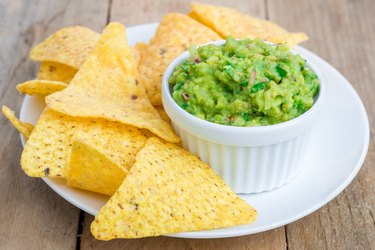
Corn tortilla chips, which are often served as an appetizer to Mexican food, are typically made with only three ingredients: corn, vegetable oil and salt. As a result, the nutrients in corn chips are basically a combination of those in oil and corn. The oil provides healthy fats and vitamin E, while the corn provides fiber, minerals and vitamin B.
Calories and Carbohydrates
Video of the Day
A 2 oz. serving, which equals about 14 pieces, of corn tortilla chips contains 280 calories. Slightly more than half of these calories come from the 38.4 g of carbohydrates in each serving. There are three types of carbohydrates: sugar, fiber and starch. The carbohydrates in corn chips are primarily starch, of which there are 34.3 g. Corn chips are low in sugar, with less than 1 g per serving, and fiber. One serving of chips contains 2.7 g of fiber, which is 10 percent of the recommended amount per day for adults. Eating the chips with ¼ cup of salsa increases the fiber content to 4.7 g, which is 17 percent of the recommended amount.
Video of the Day
Fat
One serving of corn chips contains 12.3 g of fat, which provide 111 of the 280 calories. Because corn chips are usually fried in oil, most of this fat is unsaturated fat -- a healthier alternative to saturated fat, which can clog your arteries. One serving of corn chips contains only 1.4 g of saturated fat. Like all plant foods, corn chips contain no cholesterol.
Protein
Less than 10 percent of the calories in corn chips come from protein. One serving contains 4.1 g, which provide 16 of the 280 calories. This 4.1 g of protein provides less than 10 percent of the recommended amount per day for adults. If you eat your tortilla chips with ½ cup of refried beans, you would increase the protein content to 10.6 g per serving, which is 23 percent of the recommended amount for women and 19 percent for men.
Sodium
Although they are salted, corn chips remain relatively low in sodium. One serving contains 160 mg, which is 7 percent of the maximum recommended amount per day (2,300 mg) for healthy adults. Older adults and those with heart disease should limit their intake to 1,500 mg per so one serving of corn chips provides 11 percent of their maximum amount per day. Unsalted corn chips are available and contain less than 10 mg of sodium per serving.
Vitamins and Minerals
Although they do not contain a large amount of any one vitamin or mineral, corn chips do provide small amounts of a variety of these essential nutrients. One serving of chips provides 18 percent of the recommended amount of phosphorus and 10 percent of the recommended amount of manganese, both of which are essential trace minerals. One serving also supplies 10 percent of the recommended amount of vitamin B-6 and 11 percent of vitamin E.